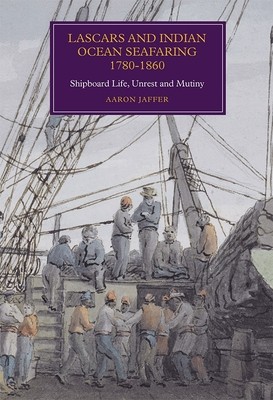
- We will send in 10–14 business days.
- Author: Aaron Jaffer
- Publisher: Boydell Press
- ISBN-10: 1783270381
- ISBN-13: 9781783270385
- Format: 15.6 x 23.4 x 1.6 cm, hardcover
- Language: English
- SAVE -10% with code: EXTRA
Reviews
Description
Cases of mutiny and other forms of protest are used to reveal full and interesting details of lascar shipboard life.
Shortlisted for the Royal Historical Society's 2016 Gladstone Prize. Lascars were seamen from the Indian subcontinent and other areas of the Indian Ocean region who were employed aboard European ships from the sixteenth to the twentieth centuries. They experienced difficult working conditions and came from a wide variety of ethnic, cultural and religious backgrounds, which created considerable scope for friction between them and their Europeanofficers. This book, based on extensive original research, examines the role of lascars employed aboard country ships, East Indiamen and other British sailing vessels. The focus is on protest in its various forms, from mild unrest to violent acts of mutiny in which lascar crews murdered officers, seized ships and then sought refuge with local rulers. It is only through descriptions of such events - found in logbooks, seafaring diaries and the East India Company's judicial records - that many aspects of lascar life at sea become visible and lascar voices can be heard. Through the study of mutiny and other forms of protest, the book provides a detailed insight into shipboard conditions amongst lascars employed during this period. Aaron Jaffer completed his doctorate in history at the University of Warwick.EXTRA 10 % discount with code: EXTRA
The promotion ends in 20d.08:36:48
The discount code is valid when purchasing from 10 €. Discounts do not stack.
- Author: Aaron Jaffer
- Publisher: Boydell Press
- ISBN-10: 1783270381
- ISBN-13: 9781783270385
- Format: 15.6 x 23.4 x 1.6 cm, hardcover
- Language: English English
Cases of mutiny and other forms of protest are used to reveal full and interesting details of lascar shipboard life.
Shortlisted for the Royal Historical Society's 2016 Gladstone Prize. Lascars were seamen from the Indian subcontinent and other areas of the Indian Ocean region who were employed aboard European ships from the sixteenth to the twentieth centuries. They experienced difficult working conditions and came from a wide variety of ethnic, cultural and religious backgrounds, which created considerable scope for friction between them and their Europeanofficers. This book, based on extensive original research, examines the role of lascars employed aboard country ships, East Indiamen and other British sailing vessels. The focus is on protest in its various forms, from mild unrest to violent acts of mutiny in which lascar crews murdered officers, seized ships and then sought refuge with local rulers. It is only through descriptions of such events - found in logbooks, seafaring diaries and the East India Company's judicial records - that many aspects of lascar life at sea become visible and lascar voices can be heard. Through the study of mutiny and other forms of protest, the book provides a detailed insight into shipboard conditions amongst lascars employed during this period. Aaron Jaffer completed his doctorate in history at the University of Warwick.

Reviews